Major: Biology
Date of Travel: January - April 2019
Date of Graduation: December 2019
Theme of Trip: Wildlife and ecosystem conservation and research within a Spanish language immersion context
Sponsors of Trip: McLean Travel Grant, Parsonage Fund and the Parker Matzinger Internships of Impact Award
Locations: Ecuador- Quito, Cloud Forest, Rio Bigal Biological Reserve (Sumaco Volcano National Park), Yasuní National Park, Cuyabeno Biological Reserve, Galápagos Islands Perú- Lima, Cuzco, Aguas Calientes (Machu picchu) Costa Rica- Alajuela, Puerto Jiménez, Golfito, Corcovado National Park
This winter semester I was very fortunate and I spent the full semester abroad in a variety of educational roles. I studied abroad through an organization focused on empowering young conservationists through education (called Wildlands Studies), and also conducted research for Professor Erik Olson’s wildlife monitoring project in Corcovado National Park, Costa Rica. For six weeks, myself and 17 other undergraduate students from around the United States embarked on a course in which we focused on the conservation history, current efforts and future solutions for the ecosystems and wildlife of four distinct ecosystems; cloud forest, pre-montane tropical rainforest, lowland rainforest (Amazon), and the Galápagos Islands. Throughout the course we spoke primarily English, but whenever we were staying over in a town or working with locals, I exercised my Spanish speaking and comprehension skills.
After the six week course in Ecuador’s beautiful nature reserves and wild spaces, I embarked on a two- week study break in which myself and four other students travelled around Ecuador’s high Andes regions and then eventually made our way down to Perú. Hiking was our primary activity and we met so many kind people along the trail (figuratively and literally). Myself and one other person in our little travelling group were the Spanish speakers and that is when I realized I still have so much to learn! After two weeks of travelling for fun, our group parted ways and I made my way up to Costa Rica for the third and final part of my travels.
In Costa Rica, the Spanish is more rapid and contains many colloquialisms, but as the days progressed, I found myself understanding more and more, which was kind of a thrill! While in Costa Rica I was fortunate enough to work for Professor Erik Olson on his wildlife monitoring project in the field of Corcovado National Park, Costa Rica. I was on the Osa Peninsula for about five weeks, alternating my time in the little town of Puerto Jimenez, and in "el bosque" (the rainforest) of Corcovado NP. In town I spent my time entering and organizing camera trap data, but the majority of my time in Costa Rica was spent in the park, checking trail cameras that were put up throughout the park in January, as part of the research project partnership between Northland College and SINAC, the park service of Costa Rica. The time in the rain forest included staying up to a week in the National Park in Ranger Station accommodations and hiking 5-20 kilometers per day to access the cameras! I had a bonus learning experience where I was able to assist in the GPS collaring of White lipped Peccaries in the park with an organization called Osa Conservation.
I feel so thankful to have experienced the world in such a unique, beautiful and impactful context and I hope to return to Latin America very soon!


***************************************************
Liz White

Double Major: Sustainable Community Development and Business
Date of Travel: June - July 2018
Date of Graduation: May 2016
Theme of Trip: Spanish language Immersion
In my final Spanish class with Professor Small, I remember her encouraging us to continue studying Spanish after we graduated from Northland. So, I decided to use the summer break between my first and second year of graduate school to study Spanish in Seville, Spain.
The primary goal of my trip was language acquisition, so I participated in a six-week intensive immersion program at CLIC (Centro de Lenguas e Intercambio Cultural). Each weekday I took classes from 9:00 am to 3:00 pm, which may seem long, but the time flew by! I loved going to class! The enthusiasm of the instructors coupled with the small class size (no more than ten students) created a highly interactive and engaging learning environment.
Many days after class, I participated in the extra-curricular activities organized by the school, such as a museum visit or Flamenco show. Not only were these fun experiences, but as they were conducted entirely in Spanish, they were valuable learning opportunities. I also participated in several of the short weekend trips organized by the school, which usually involved going to the beach!
The highlight of my experience was staying with a host family! Each day I ate breakfast and dinner with them, and sometimes in the evenings we participated in leisure activities together. They helped me feel welcome and comfortable in a new country. Also, as my host family did not speak English, staying with them helped me use Spanish much more than I would have if I had stayed in the student dorms.
I should also add that Seville is a truly beautiful city, and because it is relatively small, it is very easy to get around on foot. I would certainly recommend Seville and CLIC!
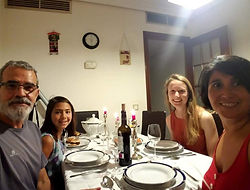


***************************************************
Michael Sinclair
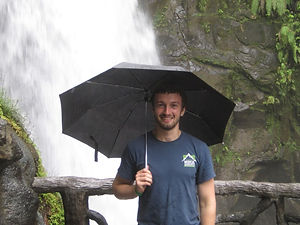
Double Major: Natural Resources and Geology
Minor: Spanish Language
Date of Travel: June-August 2015
Sponsor of Trip: National Science Foundation’s Research Experience for Undergraduates Program (REU) and the Organization for Tropical Studies
Theme of Trip: Communicating (especially about science) across borders
The summer of 2015 was a great experience for me! I spent time doing research at La Selva Biological Station in Costa Rica with an incredible bunch of researchers, grad students, and fellow undergraduates. I was investigating how the plant genus Piper interacts with their insect herbivores. Now, before you fall asleep in your chairs, it really was interesting! Piper use chemicals in their leaves to fend off insect herbivores – and the chemicals that each species uses are very different. A few Piper species even host ants that defend the plant, killing caterpillars that try to eat leaves on the plant. My research focused on how the density and diversity of Piper affected the rates of herbivores eating the plants. Working with my team of mentors from University of Nevada – Reno, I developed this project and worked on it independently. With their help, I created a report on my research that will be used in the broader research being performed on Piper.
So how does this relate to speaking Spanish? At the Station, the main language spoken among researchers is English. But there are many there that do not speak English. The incredible Costa Rican taxonomist who taught me to identify the many species of Piper, Beto, only spoke Spanish. Travelling off station, few people understand much English. To research, I had to keep working on my Spanish skills outside of the classroom. I learned a lot about the language thanks to Beto and the bilingual students in my program.
Traditionally, English has been the language of science. Many people are working to get more science translated into Spanish, so that research and scientific literature is available to Spanish-speaking people throughout the Americas. Environmental problems don’t stop at borders, so neither can our research. Science and language go hand in hand.



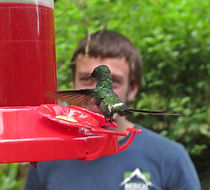
***************************************************
Rose Spieler-Sandberg

Major: Sustainable Community Development
Date of Graduation: May 2012
Date of Travel: January – April 2011
Sponsor of Trip: Northland College and McLean Travel Grant
Themes of Trip: Sustainability Through Community
Hola! I spent the winter semester of my junior year surrounded by the warm weather and rich inviting culture of Central America. There were eleven of us from around the United States, taking five courses focused around sustainable communities, through the Center for Ecological Living and Learning. We traveled around with two professors, studying in a variety of different communities. Our time was split between Nicaragua and Costa Rica—a month and a half in each country. We traveled to six different communities in total, staying with host families in order to really get a grasp on the culture and learn Spanish.
We started our journey in the city of Leon, Nicaragua. In Leon we took intense Spanish courses and learned about the history of the country and region. We even got to sled down an active volcano outside of the city, and visit the Pacific Ocean. We then moved on to the village of Sabana Grande—one of my favorite stays. In this village we worked with a group of women who sustain their community by creating and selling solar cookers. Before we traveled on to Costa Rica, we visited a place called Selva Negra—an ecolodge/organic farm/coffee estate in Northern Nicaragua. Selva Negra was located in a beautiful rain forest. We saw sloths and monkeys and went on some amazing hikes, along with learning about and working with the farm that supported the ecolodge.
In Costa Rica, we stayed on a small island called Isla Chira, where we helped out in many different ways depending on the individual skills that we had to offer. You can see a promotional video that we put together for the village here. We ended up partaking in a soccer tournament with the locals, and swimming everyday in the ocean. The most popular stay of the trip was our next destination: an organization called Asoprola in the town of Altamira. By this point in the trip, we were all getting much better at Spanish, which allowed us to integrate into the community in a special way. We did lots of work with mosaics, played soccer, danced, and did trail work. The last place we stayed was in an indigenous village in Costa Rica, part of the Bribri nation.
We partook in service learning projects and used four different discussion based textbooks during our 3-month semester. We each had two individual projects which we completed by the end, and learned through journaling, discussions, and book reports. I learned so much on this semester about the ways in which different communities work, learned so much Spanish, and had a blast the entire time. So if you feel like jumping off a waterfall, seeing crocodiles, iguanas, sloths, monkeys, and bathing in hot springs I would recommend this program to you. I would recommend traveling abroad to everyone in fact, as I would not have traded that time for anything. After the semester, I took a month to travel with friends around Costa Rica, which was wonderful as well. I came back to the US with a fresh and positive perspective for the future of our world.


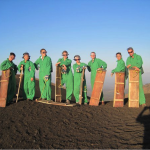


*****************************************************
Sierra Jockisch

Major: Biology
Date of Graduation: May 2012
Date of Travel: January – April 2010
Sponsor of Trip: Northland Tuition and McLean Travel Grant
Themes of Trip: Conservation Biology, Cultural Enrichment
I spent the winter semester of my sophomore year in the Andes Mountains of southern Ecuador. Seven other American students (three of them fellow Northlanders) and I took five courses through Round River Conservation Studies, all focused mostly on conservation biology. Round River works directly with Northland, making registration and credit transfer simple. We found ourselves sitting around our dining room table, either in our house in Cuenca or in a grass hut at our upper field camp, eating freshly baked banana bread, learning about Ecuador and all its amazing biological diversity. Our time was split between Ecuador’s third largest city, Cuenca, and our field camps in the páramo at 11,500ft, working a couple weeks at a time in each. Our five professors each shared stories from their very unique backgrounds, inspiring us to travel more and keep learning.
We each conducted a field research project, including Puya clava-herculis plant distribution, Pristimantis bambusiphilus frog surveys, bird surveys, and plant regeneration after fire. Several hikes a week kept us in tip-top shape, physically and mentally. We had many culturally enriching experiences in addition to our biology studies. We spent time in home stays, where we shadowed our families, eating what they ate, which was all delicious, and helping in daily activities such as milking cows and picking veggies out of the garden. After our home stays, we invited our families to our field camp for a cookout of alpaca, rice and potatoes. Later that week, we returned to the village to play some Sunday soccer. Other highlights of our time in Ecuador were watching rare Andean condors fly soar around us while trekking on El Altar, seeing Andean bears, ocelots, and kinkajous at our professor’s animal rehabilitation center, collecting blood for llama DNA work, castrating genetically unfit alpacas, and exploring the gringo filled beach town of Montañita.
Our classes were in English, so we didn’t practice our Spanish much unless we were roaming through the city, playing soccer with villagers, or trekking through the country after the program. Taking a Spanish course with Dr. Michele Small in the fall before my semester abroad was a great refresher course to complement my previous four years of Spanish in high school. I hope to continue taking Spanish courses here at Northland to further my cultural education.




*****************************************************
Max Metz Jr.
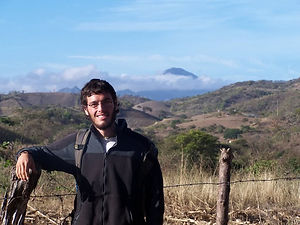
Major: Outdoor Education – Natural History
Minors: Environmental Education & Writing
Date of Graduation: May 2010
Date of Travel: February – July 2008
Sponsor of Trip: Northland Tuition and The Parsonage Fund
Themes of Trip: Sustainable Community Development, Spanish Proficiency, Exploration, Cultural Awareness, Volunteering and Service
Unjustifiably summing up my CELL experience, here is a list of opportunities I was able to be a part of: learning Spanish in a local school for two weeks, building solar panels with Nicaraguans, building solar cookers with Nicaraguans, breaking sod for new gardens in the hills of Honduras, reading many amazing books and discussing their importance with my classmates, climbing six volcanoes, sledding down one volcano, living with 12+ Central American families, picking and roasting cacao (cocoa) and making our own chocolate, patrolling beaches in search of nesting turtles in the dead of the night, and gaining a new perspective on life. The CELL (Center for Ecological Living and Learning) is the program offered by Northland. CELL is the reason I was able to leave Northland for so long and still graduate on time.
After my stay with the CELL program, I embarked on my own journey for three months. I attended a Spanish school for the month of May – walking to school every day, learning for five hours in a personal classroom, staying with a local family, and becoming exceedingly more proficient in Spanish. I wanted to do some service while in Monteverde. So, I walked into the local public high school and spoke with the principal. I asked him if I could help teach English to his students. He told me to turn around, leave his school and come back looking like a teacher (pants, collared shirt and nice shoes), then we would talk. I came back the next day, after going shopping in the market, and landed the volunteer position. I helped students every night in a tutoring program teaching English and helping the classroom teacher become more proficient in English.
After my stay in Monteverde, I met a friend in San Jose and traveled for two more months, exploring hidden treasures of Nicaragua and Costa Rica. Throughout my time in Central America, I learned the importance of gaining a world perspective, getting out of the “box” and taking the risk to help others. I could have never done this without the help of many good friends at Northland and friends I met along the way. My experience in Central America is driving me to enlist in the Peace Corps after I graduate from Northland in 2010. I will travel back to my home away from home.







*****************************************************
Ruthanne Atkinson

Date of Graduation: June 2011
Date of Travel: June 2008
Sponsor of Trip: Group fundraising, NCSA
Themes of Trip: Volunteering and Service, Cultural Awareness
When I began the Spanish program at Northland College, I was doing it to fulfill any future graduate school language requirement. However, I soon began to realize how many opportunities for work, travel, and education there were in multiple language proficiency. Professor Michele Small was always encouraging us as students to travel and explore the world, so, when the opportunity to go to Honduras with Habitat for Humanity presented itself to me a couple months into my freshman year, I didn’t hesitate.
Traveling to Honduras was my first time leaving the Midwest. My group spent the first week of our trip doing construction work on a house for a family in need in a town called Siguatepeque. We worked alongside the family, and I was able to take some of the Spanish I had learned in the classroom into the real world by talking to the children and trying to understand the instructions our site director gave us. One Sunday, we were in a plaza and there was a woman preaching passionately. As I listened, it came as a shock that I understood what she was saying! It was small, but thrilling. The work we did was exhausting, but also the most fulfilling work I had ever done. The next week, we traveled around Honduras and were lucky enough to cliff jump by the largest waterfall in Honduras, eat lunch in a Garifuna island-village and see them drum and dance, hang out on the beach, visit Mayan ruins, kayak through the mangroves, and hike in the rainforest. It was truly an unforgettable trip.
After Honduras, my view of the world changed. I decided that I wanted to work on humanitarian issues, and I became more determined than ever to learn Spanish. Northland’s Spanish program gave me a very solid language base, not to mention cultural knowledge, encouragement, and informational resources to explore the world.
Since my trip, I have returned to Honduras for a month where I worked on a friend’s organic farm and taught English as a Foreign Language at a small bilingual school in the village of El Socorro. I have also studied abroad in Mexico for 6 months and was able to travel all over the country experiencing the people, food, dance, and, of course, the language. Without the foundation and guidance provided by Michele Small and Northland’s Spanish language program, I would not have had the drive nor the courage to do what I have been able to do.


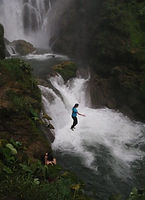
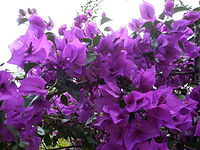
*****************************************************
Alex Johnson
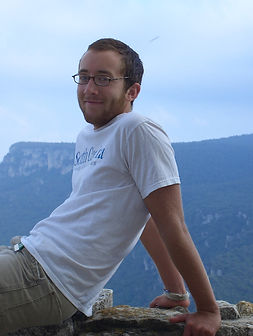
Major: Writing
Minor: Biology
Date of Graduation: May 2008
Date of Travel: Summer 2005
Sponsor of Trip: Kemper Fellowship, McLean Travel Grant
Themes of Trip: Speaking Spanish, Organic Gardening, Backpacking
During the summer of 2005, I traveled with Greta Anderson through northern Spain, as well as southern France and Italy. In Spain, we hiked 150 miles of El Camino de Santiago, an ancient pilgrimage route through the Pyrenees. We then worked at a family-owned spiritual retreat center on top of Mont Ral, two hours outside of Barcelona. At the retreat center, we worked in their organic garden and did various maintenance jobs on the breathtaking grounds. We explored the surrounding countryside, which included ancient chapels and secret springs that surfaced in pools and waterfalls. During our travels, we also saw the running of the bulls in Pamplona’s San Fermines and wandered the riotous streets of Madrid, Bilboa, Barcelona, Venice, and Rome.
After returning back to Northland, I produced an 80-page written account of our travels, for which I received independent-study credit. Overall, the trip was highly valuable for my academic education, spanish proficiency, and life perspective!




*****************************************************
Peter Mueller

Major: Geoscience
Date of Graduation: May 2006
Date of Travel: April and May 2006
Sponsor of Trip: Parsonage Fund
Themes of Trip: Organic Greenhouse Gardening, Speaking Spanish, Karst Geology Exploration
Traveling solo to Puerto Rico allowed me to broaden upon my experiences at Northland College. Leaving the small town of Ashland to explore a culture, language, and customs beyond my Mid-Western scope allowed me to develop a greater understanding of the beauty the world holds. While in Puerto Rico, I spent nearly two weeks volunteering at an organic greenhouse in the interior hills of the main island. Ferrying out to Puerto Rico’s lesser known island Culebra and Vieques tested my Spanish speaking and coordinating skills. Upon returning to the main island, I zipped around the island taking in geologic sights such as El Parque de Las Cavernas del Rio Camuy on “collectivo” or public vans. Overall, my fortune to travel to Puerto Rico ignited a life-long desire to travel and further my comfort with the Spanish Language. I have gone on to spend months of travel and language school in Mexico.

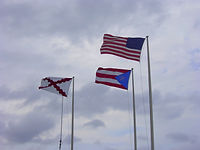


*****************************************************
Mary Hammerbeck
Major: Creative Writing
Date of Graduation: May 2003
Date of Travel: Fall Semester 2002 to Quito, Ecuador
Sponsor of Trip: The international Partnership for Service-Learning
While studying the Spanish language at Northland College, I spent a semester abroad in Quito, Ecuador with The International Partnership for Service-Learning. I benefited considerably from Dr. Michele Small’s instruction on the formal elements of Spanish, as well as from her enthused guidance in seeking opportunities abroad. Studying with Michele at Northland was a wonderful foundation for the far-flung adventures I sought and the heightened learning curve I’d experience along the way. This support and my desire to speak Spanish sent me to Quito, Ecuador where I enrolled in a semester-long service-learning program.
I attended La Universidad de San Francisco as an international student (I took dance, art, ethnography, and Spanish classes—all taught in Spanish) and taught English to elementary students who spoke both Spanish and Quechua (and were beginning to learn English) at Escuela Jesus El Buen Pastor. I lived with a family in a flat in the valley of the Andes, traveled the country by public bus on the weekends (from the Pacific coast to the Andes to the Amazon rainforest), and learned the Spanish language day-in and day-out. I now know I would never had learned the language so quickly if it hadn’t been for this experience of total immersion. And Ecuador remains in my mind the most idyllic country to immerse one’s self in. The self-awareness that comes from learning a new language and navigating a foreign country was and is one of the most influential experiences of my life—and continues to influence the path I travel.
Since graduating from Northland, I’ve lived in Guatemala (I taught English during the week and traveled throughout Guatemala and Honduras in my spare-off), worked as a Spanish/English interpreter for Minneapolis Public Schools, conducted linguistic research on the Texas/Mexico borderlands for the completion of my graduate thesis “Poesía de la Frontera,” and currently work as an English faculty at Whatcom Community College in Bellingham, WA. My desire to travel and continue to improve my Spanish skills has emerged in these ways of life and, as far as I can tell, has been a path set in motion by those early years studying at Northland.
I learned I love to teach at that school in Quito (I can still see the jubilant faces of those children), and that has eventually led me to my teaching job now, but most importantly, I learned I love adventure, and it’s too soon to tell where that will eventually lead. Pura Vida!

